Eric E. Wright's Blog, page 42
January 3, 2013
Shooting at Nothing – And Hitting It!
 Winter provides time to plan ahead for the coming of spring: changes to the garden, repair of my rustic bridge, and the need to cut down a couple of dying trees.
Winter provides time to plan ahead for the coming of spring: changes to the garden, repair of my rustic bridge, and the need to cut down a couple of dying trees.
The New Year is also a time to review more general life goals. So as January rolls around, I take out my 3 x 5 card for 2012 and check out the goals I wrote down a year ago. I can quickly see that I’ve fallen short in a few areas but in spite of arthritic knees I have been able to walk 30 minutes a day, four out of seven days. Okay, I’ve missed the mark on some of my writing goals and I need to achieve more balance in my reading between fiction and non-fiction. My spiritual goals are a little harder to evaluate. After evaluation comes ma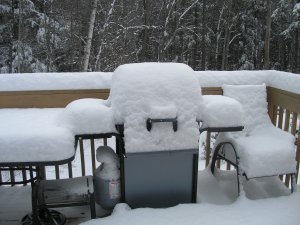 king a new list of goals for 2013.
king a new list of goals for 2013.
Many decide that since most of their New Year’s resolutions will be broken, it’s better not to make any. Just let life unfold from day to day. That kind of relaxed approach to life doesn’t work for me. I need something to shoot for, even if I fall short. After all, didn’t Paul say, “I press on toward the goal to win the prize for which God has called me heavenward in Christ Jesus” (Phil3:14).
But I can see two problems with my goal-setting. First, I tend to set unrealistic goals and multiply the number of goals. Clearly, I need to pare down the number and make them more realistic.
Secondly, I need to distinguish between goals and prayer requests. Goals can only be set for areas where I am responsible to take action. For example; takin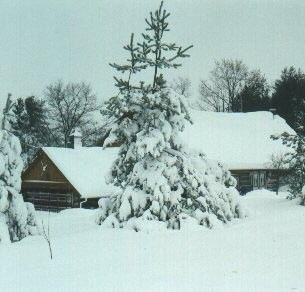 g exercise, writing, learning networking, making reading choices, getting rid of clutter, and so on. But other areas where I desire change, can only be achieved if the Lord wills. Only He can see that my new suspense novel, Riptide, is published by a royalty publisher. Only He can provide opportunities to preach and teach. And, although I can set goals for daily prayer and Bible reading, only He can turn spiritual principles into character qualities so that I can be more conformed to the image of Christ.
g exercise, writing, learning networking, making reading choices, getting rid of clutter, and so on. But other areas where I desire change, can only be achieved if the Lord wills. Only He can see that my new suspense novel, Riptide, is published by a royalty publisher. Only He can provide opportunities to preach and teach. And, although I can set goals for daily prayer and Bible reading, only He can turn spiritual principles into character qualities so that I can be more conformed to the image of Christ.
Unlike some pundits of positive thinking, I know that determining our future by setting goals is not what faith means. We will need flexibility and faith to accept, as from Him, the ups and downs that come our way in the New Year. God is sovereign. He knows best what I need. Fortunately, “He leadeth me, o blessed thought, o words with heavenly comfort fraught.” And so, may God give us a balance between actively doing what we know to be His will and passively accepting the mysterious unfolding of His purposes.


December 19, 2012
Suffering in a Fallen World
 #2 in a series.
#2 in a series.
The universe displays breath-taking beauty. Sunsets and starry skies. Soaring mountains and spiral galaxies. Lilies and roses and frangipani. But! Every leaf that fell from our now naked deciduous trees proclaims an unpalatable reality; everything has been marred by some malevolent influence. Each leaf bears evidence of the depredations of either insects or disease.
Not only in the leaves, but everywhere we look we discove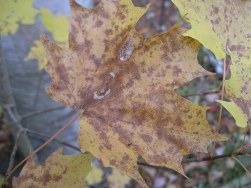 r evidence of defects. Weeds continue to choke the iris and day lilies I’ve planted around the edge of our front lawn. Mosquitoes and black flies pester us in summer. Mice and ants invade our home. Our mature birch trees are dying from the top down. Cankers attack our beech trees.
r evidence of defects. Weeds continue to choke the iris and day lilies I’ve planted around the edge of our front lawn. Mosquitoes and black flies pester us in summer. Mice and ants invade our home. Our mature birch trees are dying from the top down. Cankers attack our beech trees.
Our world often seems like a dangerous place. Floods and drought, typhoons and earthquakes, volcanoes and storms threaten populations. Human beings provoke wars, distribute poison in the form of drugs, abuse children, oppress the poor, and enslave the powerless. And too often an atrocity like the deranged gunman who took 26 lives in Connecticut occurs.
Microbes and bacteria infect our immune systems. We come down with colds and flu, hepatitis and clogged arteries, diminished memories and arthritic knees. Despite the claims of the beauty industry, an aging clock relentlessly ticks away within all of us. Whenever we honestly look in the mirror, we see its effect. Let’s face it, we will all die. One hundred per cent of us.
Why is it like this? For the origin of all imperfection and suffering, we must go back to origins; back to the historic, space-time fall of Adam and Eve in the garden. (Read Genesis 3) As the progenitors of all people, t hey chose to disobey God and as a result fell from original goodness into sin. Their fall not only set in motion their own deterioration and death but fractured the harmony of the cosmos. And all their progeny have inherited a sinful nature with a twisted bent to selfishness and evil. Women inherited great pain in childbirth. Painful toil in tilling the ground became man’s lot. Thorns and thistles arose along with a myriad other malevolent influences. As someone has said, “All nature is red in tooth and claw”.
hey chose to disobey God and as a result fell from original goodness into sin. Their fall not only set in motion their own deterioration and death but fractured the harmony of the cosmos. And all their progeny have inherited a sinful nature with a twisted bent to selfishness and evil. Women inherited great pain in childbirth. Painful toil in tilling the ground became man’s lot. Thorns and thistles arose along with a myriad other malevolent influences. As someone has said, “All nature is red in tooth and claw”.
Since that historic fall, “the whole creation has been groaning as in the pains of childbirth right up to the present time”(Rom. 8: 22). This is why Christmas is so central to history. Jesus Christ, the Son of God, came into our world to begin the restoration process. He calls all men and women to allow him to inject the antidote into our hearts, the antidote that will conquer our bent to selfishness and sin. He earned the right to call us to faith and repentance by dying for our sins upon the cross. Everyone who heeds His gospel call finds himself beginning to be changed from the inside out. (The new birth.) Ultimately, Christ will return to right all wrongs and to r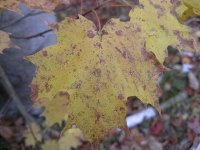 estore the earth to a state of goodness and grace.
estore the earth to a state of goodness and grace.
So, why do apparently good people, even God’s children suffer? It’s inevitable. We live in an imperfect, fallen world where bad things happen indiscriminately. Fortunately, in the lives of His children God is able to squeeze good from evil. So in spite of evil, let’s celebrate Christmas, the promise of its ultimate extinguishment. [Continued]


December 12, 2012
When too much description hinders a book
 Sylvia by Bryce Courtenay
Sylvia by Bryce CourtenayMy rating: 3 of 5 stars
Courtenay weaves a captivating tale of quite striking characters into a historical event from the year 1212. The medieval setting is abysmally dark and full of superstition, cruelty, ignorance, and church abuse. Belief in magic and signs and omens rules the populace.
Sylvia, after whom the book is named, rises from unpromising and abused peasant stock to become the petticoat angel. Sylvia's remarkable intelligence combined with her skill in calling birds, learning languages, and amazing the populace figures often in the scrapes she and her friends endure. They attribute miracles to her powers. But she herself struggles with issues of faith and whether she should be a nun.
Her skill is quickly recognized by reinhardt, the Rat Catcher (the piet piper of Hamlin) who adopts and protects her. His magic skill with the flute to call rats to drown in the river or still ravening dogs can also be called upon to accompany the astounding ability of Sylvia to sing either the Latin liturgy or folk songs. She sings like a angel. The two of them wander from town to town mesmerizing the populace until they seek help from a Jewish tailor whose wife sees their potential.
Very early in one of her retreats to the woodland where she can find quiet, Sylvia makes the acquaintance of one of the children who live on the streets. Through an unusual means which I won't disclose, Nicholas of Cologne becomes a preaching sensation and the leader of the Childrens' Crusade to Jerusalem.
This crusade, one of the most bizarre but true happenings of the period is described through the eyes of these three: Sylvia, Nicholas, and Reinhardt, the rat catcher/piped piper.
While the book took me deep into the historal period, I found myself scanning an skipping paragraphs. The author, in my opinion, is much too wordy employing too much description; telling rather than showing. As I read recently from CSLakin, "I really believe it’s true—not just in description but in just about every aspect and element in a novel. Less spoken, more implied. Less shown, more left up to the imagination."
And thus I have given it a 3 rather than a 5.
View all my reviews
December 11, 2012
Why Suffering?
Among the seasonal letters we’ve been getting from friends, the news from five has hit us like a punch in the gut. Four struggle to lovingly care for partners with Alzheimer’s. One just received the diagnosis of pancreatic cancer. All five have served God long and consistently. They still do.
Their situations dredge up the perennial questions. Why is there so much suffering in the world? Why do those who serve God seem to suffer as much or more than others? Why not just give up and wallow in misery?
Can the cause of personal suffering be found in the sufferer? The catastrophes that burst on Job led his friends to search in Job’s life for some root of rebellion against God, some sin that would cause God to judge him. They were wrong in thinking that Job brought it on himself. The reasons for Job’s trials were not to be found in him but in a clash between God and Satan. Ultimately, God vindicated Job but did not explain why he lost his sons and his wealth. Instead he called upon him to trust in the infinite and inscrutable wisdom of God.
The story of Job tells us that we will rarely understand why suffering occurs. The cause may be rooted in the rage of Satan in the heavenly places. (Read Job 1) The devil knows that his time is short. He hates God. He hates God’s beautiful creation. And he especially hates all God’s redeemed children. Living as we do in a conflict zone, we must learn to trust in God and put on his full armor. “For our struggle is not against flesh and blood, but against…the spiritual forces of evil in the heavenly realms”(Eph. 6:12).
Asaph had a similar quandary in Psalm 73. He was astonished at the arrogance and prosperity of the wicked in the light of the sufferings of the righteous. Why do they have so few struggles? Why are they so healthy? While, “all day long I have been plagued”(Psalm 73:14). It was only when Asaph took the long view that he saw the doom toward which the wicked were racing—the judgment of God.
In the midst of suffering let’s remember that if we believe in Christ as our savior, we “are aliens and strangers on earth”(Heb. 11:13). Like Abel, Enoch, Abraham and Noah along with the whole catalogue of the faithful in Hebrews eleven may God help us to live by faith, “longing for a better country—a heavenly one”(Heb. 11:16). Jesus has promised to prepare that heavenly place for us. (See John 14:1) And what about our aching, failing bodies? Jesus rose from the dead to be the first-fruits of all those who will inherit an imperishable, immortal, glorious body free from pain, a body like unto His. (See 1 Cor. 15:50-57.)
While faith and hope give us glimpses of a glorious future, let’s not forget to look back to the beginning for the real cause of suffering. Remember, “the sting of death is sin”(1 Cor.15:56). And where did sin come from? I’ll tackle that ultimate question in the next blog.
Meanwhile, as I struggle with interrupted sleep, aching knees and blocked arteries I need to remember that spiritual health is more important than anything. “Be very careful how you live—not as unwise but as wise…understand what the Lord’s will is…be filled with the Spirit…always giving thanks to God the Father…put on the full armor of God”(Eph. 5:15,17,18,20; 6:11).
Let me know your thoughts.


December 4, 2012
The Twelve Original Participants in Christmas
Throughout December we hear uncounted replays of Irving Berlin’s White Christmas. You know the one, “I’m dreaming of a white Christmas just like the ones I used to know.” Now, I must admit I love to wake up Christmas morning to a blanket of white covering field and forest. The season brings a certain nostalgia as Christmas cards start arriving with idealized villages deep in snow, kids skating on frozen ponds and sleighs drawn by high stepping stallions. In our part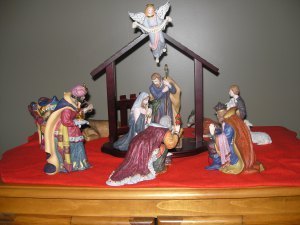 of the world we expect a snowy Christmas. Even south in Florida and across the globe in Australia and Fiji, it’s part of the mythology of Christmas.
of the world we expect a snowy Christmas. Even south in Florida and across the globe in Australia and Fiji, it’s part of the mythology of Christmas.
Of course, some Christmases are green. Temperatures stay well above freezing. Maybe that’s not a bad thing—reminding us to get back to the real history behind the myth. The story behind the fairy tales of Santa Claus, Frosty the snowman, Rudolph the red-nosed reindeer—the truth beyond the tinsel and trees, the feasting and buying. Merchants tell us they sell more at Christmas than at any other time of the year. Anyone who has tried to find a parking space at a mall during December will have to agree. Christmas means crowds of often grumpy people thronging the shops.
Was the first Christmas green? Does it snow in Bethlehem? Rarely. We do know that there were no crowds around the manger. God chose only about twelve or so people to participate in the original pageant. Most of the relatives and neighbours of Mary and Joseph had no idea what was happening. The religious leaders took no note of the birth of this child until foreign visitors arrived. King Herod and the political establishment missed the event that would separate history into AD and BC time. The innkeepers of Bethlehem were too busy counting their coins to notice another arrival, even if the woman was heavy with child.
Very few had a clue that history would never be the same. Fifteen months before the birth of Christ, an angel informed Elizabeth and Zechariah that their son John would prepare the way for the coming of the Lord. That makes two who had an inkling. Nine months before Jesus’ birth Mary, and then Joseph, became participants. On the night of his birth an angel gave the news to two or three shepherds. That makes six or seven. Eight days after his birth God moved Simeon and Anna to celebrate the arrival of a Savior when his parents brought him to the temple. That makes eight or nine included in the drama. Almost a year later the Magi arrived. Although the text does not specify that there were three wise men, we know there must have been at least two. If we add up all the participants we find that God specifically chose eleven or twelve people to take part in the most astounding event in history—the incarnation of the Son of God.
Why so few? The record indicates that all shared something in common. As a young woman, Mary could say, “my soul glorifies the Lord and my spirit rejoices in God my Saviour” (Luke 1:46,47). Joseph “was a righteous man” (Matt. 1:19) who did not want to expose Mary “to public disgrace.” Elizabeth an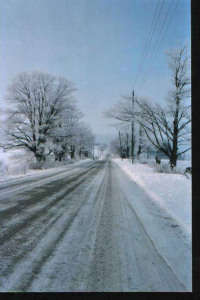 d Zechariah “were upright in the sight of God observing all the Lord’s commandments and regulations blamelessly” (Luke 1:6). Simeon “was righteous and devout” (Luke 2:25,26). Anna “worshipped night and day” (Luke 2:37). The text reveals nothing about the character or habits of the shepherds, however, the speed with which they went to find the baby and the way they left “glorifying and praising God” leads me to believe they were very sensitive to God. The Magi undertook a lengthy and dangerous journey with the express purpose of worshipping Christ. (Matt. 2:2)
d Zechariah “were upright in the sight of God observing all the Lord’s commandments and regulations blamelessly” (Luke 1:6). Simeon “was righteous and devout” (Luke 2:25,26). Anna “worshipped night and day” (Luke 2:37). The text reveals nothing about the character or habits of the shepherds, however, the speed with which they went to find the baby and the way they left “glorifying and praising God” leads me to believe they were very sensitive to God. The Magi undertook a lengthy and dangerous journey with the express purpose of worshipping Christ. (Matt. 2:2)
Spiritual sensitivity links these twelve participants. They were conscientious worshippers—devout seekers after God.
In his Sermon on the Mount Christ taught, “Blessed are the pure in heart for they shall see God” (Matt. 5:8) Martyn Lloyd Jones points out that the purity mentioned here denotes singleness of vision and freedom from defilement. By singleness of vision, he means a focus on God—a God-centredness. This clear vision of God, in turn, leads the pure in heart to embrace what is good and true and holy—to flee defilement of any kind. In the grubby world in which we live such purity is rare. Those who treasure such purity see beyond the tinsel and trappings of Christmas—they see God. May that be true of us this Christmas!


November 28, 2012
Behind the clouds the Sun shines
Frowning Providence & God’s Smiling Face
I commented to a friend one day how welcome the sun was after so ma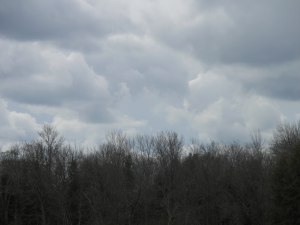 ny cloudy and stormy days. An inveterate optimist who seems to always discover a silver lining in otherwise gloomy circumstances, she pointed out that the sun was always there, even when hidden from view. To ensure that I didn’t miss the spiritual application, she also reminded me that the Lord is always with us even when things look dark.
ny cloudy and stormy days. An inveterate optimist who seems to always discover a silver lining in otherwise gloomy circumstances, she pointed out that the sun was always there, even when hidden from view. To ensure that I didn’t miss the spiritual application, she also reminded me that the Lord is always with us even when things look dark.
I don’t often appreciate people turning an innocent comment about the weather into a soapbox. But this particular friend is such a sunny Christian who faces challenging circumstances with laudable faith, that one can’t be annoyed with her. Don’t you wish there were more positive, hopeful Christians committed to spreading sunshine wherever they go? In my case, her comment has inspired me often to revel in the promised presence of our triune God—and led to this devotional.
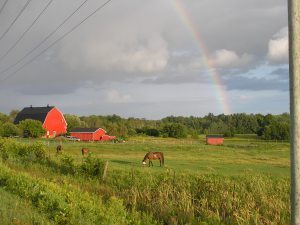 The Bible is replete with reminders of this truth. The Lord is my shepherd…He leads me…He restores my soul… He guides me…I will fear no evil, for you are with me. (Psalm 23)
The Bible is replete with reminders of this truth. The Lord is my shepherd…He leads me…He restores my soul… He guides me…I will fear no evil, for you are with me. (Psalm 23)
It is hard to imagine someone facing more challenges and difficulties than David. And yet he was able to pen not only the twenty-third psalm but many other gems. The following verse from his pen, I’ve often claimed: I have set the Lord always before me./Because he is at my right hand,/ I will not be shaken. (Psalm 16:8)
Jesus warned his disciples three times about his coming death, an event that could have totally shaken their faith. To prepare them he explained; I will ask the Father, and he will give you another Counselor to be with you forever—the Spirit of truth.…He lives with you and will be in you. I will not leave you as orphans. (John 14: 16-18)
Then just before his ascension, He gave them the Great Commission. Embedded in that command was his promise: And surely I am with you always, to the very end of the age. (Matt. 28:20)
Knowing that our Lord is present beyond the veil of sight, will not deliver us from troubles. Economic challenges will sometimes stymie us. We must continue to remain vigilant in traffic. Illness may lay us low. Sorrow could dog our footsteps. Relationships may falter. Persecution might come. But we will never be alone.
Angels will be attending our pathway. Jesus Christ will be praying t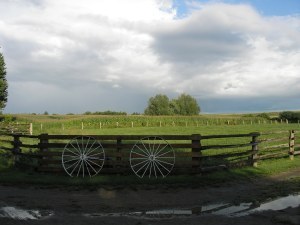 hat our faith fail not. The Holy Spirit will be within us empowering us to resist the enticements of our own fallen nature. The Father will be operating behind the scenes so that all things in our lives will work out for our good and His glory. The Holy Spirit will be interceding for us with groans that words cannot express. All the resources of heaven will be bent on carrying us triumphantly to heaven.
hat our faith fail not. The Holy Spirit will be within us empowering us to resist the enticements of our own fallen nature. The Father will be operating behind the scenes so that all things in our lives will work out for our good and His glory. The Holy Spirit will be interceding for us with groans that words cannot express. All the resources of heaven will be bent on carrying us triumphantly to heaven.
We live in a fallen, chaotic world prone to earthquakes, hurricanes, floods and wars. But as the hymn writer reminds us: Behind a frowning providence, He hides a smiling face.
Although sometimes hidden, the Lord God is a sun and shield; the Lord bestows favor and honor. (Psalm 84:11) (For other devotional readings bringing Scripture and nature together go to Eric’s web site, www.countrywindow.ca or purchase his book, Down A Country Road.)


November 22, 2012
The Banquet Invitation and the party crasher
A king prepared a wedding banquet for his son. When everything was ready, he sent his servants with a fleet of Cadillacs to pick up the invited guests. But the guests ignored the servants. One went off to check on his ranch. Another refused to leave his business. Several others heaped abuse on the servants, smashing the windshields of their limousines and fatally wounding several. The king was enraged. He called in his palace guard and sent them to destroy the ranch of one, the business of the other and cast the violent ones into the sea.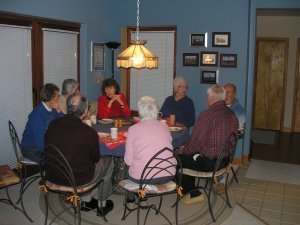
After pondering what to do with the magnificent banquet that was ready to be served, he sent more servants out into the city’s streets and alleyways to gather all the people they could find; the good, the bad, the downtrodden, the poor, the homeless, and the prostitutes. “The empty seats must be filled,” he said. “Provide them all with wedding garments.”
 But when everything was ready, the king went in to begin the celebration. But he was astounded to see one man wearing only shorts and sneakers instead of the required suit and tie. “How did you get in here without wedding clothes?” he said. The man trembled but could not answer. The king then ordered that the man be cast outside.
But when everything was ready, the king went in to begin the celebration. But he was astounded to see one man wearing only shorts and sneakers instead of the required suit and tie. “How did you get in here without wedding clothes?” he said. The man trembled but could not answer. The king then ordered that the man be cast outside.
King Jesus invites many to his salvation banquet but sadly many make excuses, despise his offer or live distracted self-centered lives. Often it is the weak and despised who celebrate the good news banquet. But some try to crash the happy party without putting on the robes of righteousness that Christ provides. Sad, that so few heed his words, “Come onto me.” (See Matthew 22:1-14.)


November 19, 2012
Wild Turkey Time
The turkeys that most interest me don’t grace our dinner tables but wander through our backyard. I’m not talking about a thanksgiving or Christmas turkey but about wild turkeys.
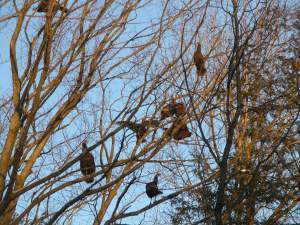 In the morning when I get up to put on the coffee, I invariably check the thermometer and then spend a few moments at the back window trying to gauge the day’s weather. So far this year, the wild turkeys have not appeared in our yard although we’ve seen them in the neighbourhood.
In the morning when I get up to put on the coffee, I invariably check the thermometer and then spend a few moments at the back window trying to gauge the day’s weather. So far this year, the wild turkeys have not appeared in our yard although we’ve seen them in the neighbourhood.
But one morning, a year or so ago, I saw a strange sight. High on the branches of our giant sugar maple, I could make out a scattering of dark blobs. As the light grew the blobs became a flock of nesting wild turkeys. Others were scattered in twos and threes high up in nearby oaks and pines.
I excitedly pointed them out to Mary Helen. Somehow we missed seeing them depart but that night I determined to lure them closer to the house by scattering bird seed. The next morning we again spotted them nesting for the night in our trees—safe from marauding coyotes.
For several days they came every night and departed every morning. Fortunately, this happened when the grandkids were around. So we all were delighted to keep a vigil each night for their arrival.
Then as suddenly as they had appeared, they vanished from 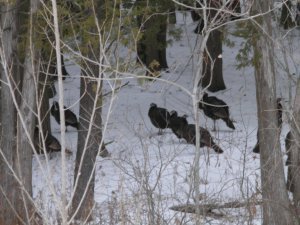 our yard for the rest of the winter. On rare occasions we spied them crossing our road or feeding in the apple orchard nearby. They probably instinctively knew that they should vary their haunts to foil predators.
our yard for the rest of the winter. On rare occasions we spied them crossing our road or feeding in the apple orchard nearby. They probably instinctively knew that they should vary their haunts to foil predators.
Wild turkeys, like many wild animals and birds, have to continually seek safety from their enemies. In this flock there were always some toms standing guard, turning their beady eyes in every direction.
Turkeys know that the price of safety is vigilance. As Christians we are very unwise to trust in our own strength, to be over confident, or to express unwarranted braggadocio. We should always remember, “The name of the Lord is a strong tower, the righteous run to it and are safe”(Prov. 18:10). Christ is our safety; his prayers our guard. No wonder throughout the Bible believers talk about the Lord being a fortress, a tower, and a rock. Let us be humble enough to often cry out to God for his aid and protection from the fiery darts of the wicked one. As we travel. Where we work. At home. During the day and for the night.


November 5, 2012
Spreading Sunshine not Gloom
These November mornings I find myself taking longer to wake up and shake off the aches and pains of arthritic joints. I hobble down the hall into the kitchen, fumble with the coffee maker then collapse on my overstuffed armchair content to ease into the day slowly—very slowly. It’s downright annoying and quite humiliating. Where did the vigor and energy go that had me jumping out of bed to embrace a new da y while I sang the hallelujah chorus? Okay, maybe my memory is a bit cloudy here, especially when it comes to singing anything.
y while I sang the hallelujah chorus? Okay, maybe my memory is a bit cloudy here, especially when it comes to singing anything.
If I let myself, I could easily feel as gloomy as the yard outside the window looks. Leaves litter the grass. The flowers are shriveled husks. The deciduous trees are bare, except for some beech and oak whose leaves hang on longer. I face another day of November rain with four or five months of winter ahead. And I haven’t serviced the snow blower yet.
Everything reminds me of the verse, “outwardly we are wasting away”. Now, that’s the way I feel! And as I look out the window, that caption could be written beneath all the broad leaved trees. In late fall and winter, it takes a very discerning eye to separate the living trees from those that are dead. Sometimes a canker on the trunk of a tree betrays the inner rot. Among others woodpecker holes signal the presence of carpenter ants eating their way through the heartwood.
But inside, most of those trees are very much alive, just waiting for the spring. And what about us? Isn’t there more to that verse than a lament about our aging bodies? Ah, here it is. “We do not lose heart. Though outwardly we are wasting away, yet inwardly we are being renewed day by day. For our light and momentary troubles are achieving for us an eternal glory that far outweighs them all. So we fix our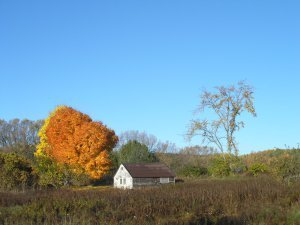 eyes not on what is seen, but on what is unseen. For what is seen is temporary, but what is unseen is eternal” (2 Cor. 4:16-18).
eyes not on what is seen, but on what is unseen. For what is seen is temporary, but what is unseen is eternal” (2 Cor. 4:16-18).
Daily, the Holy Spirit refreshes our spirits by reminding us that not only does God love us now, but He is preparing a bright future for us. “In my Father’s house are many mansions…I go to prepare a place for you” (John 14:2).
Lord of heavenly glory and earthly help, enable me to see beyond the seen; beyond the temporary pains and problems into a future bright with glory; a future that is eternal. And help me to be a cheerful glory-spreader instead of a gloom dispenser. But, and this is a big but, help me to be real and not just plaster a smile on my face. For shiny, artificially happy Christians are insufferable.


October 26, 2012
Falling Leaves–Finding Stability in a Changing World
Fallen leaves litter lawns. Trees stand bare. A northwest wind assails pedestrians causing them to turn up their collars against the bite. A chill of grumbling about the long months ahead frosts conversation around the water coolers. People talk wistfully of last summer’s fu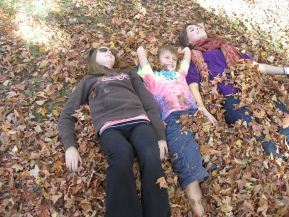 n and of retiring early so they can move to a country that has summer all year long. A place where the leaves never fall.
n and of retiring early so they can move to a country that has summer all year long. A place where the leaves never fall.
We forget that no place on earth is safe from change. Most of the countries with summer-like climates have tsunamis and typhoons and volcanoes and coups and runaway inflation and malaria. Better to look elsewhere for something changeless.
Where shall we look? Malachi reminded Israel that the promise of their escape from total destruction was rooted in the covenant promises God made to Jacob. 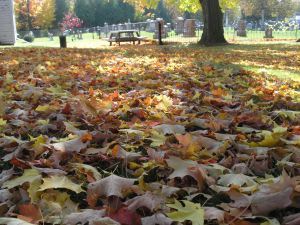 “I the Lord do not change. So you, O descendants of Jacob are not destroyed.” (Malachi 3:6)
“I the Lord do not change. So you, O descendants of Jacob are not destroyed.” (Malachi 3:6)
The storms of winter that will break around us need have no impact on our soul health. Like Jacob, those who have been born again by faith in the gospel seed discover that their soul-stability rests in God’s unchanging word. “For you have been born again, not of perishable seed, but of imperishable, through the living and enduring word of God.” In this passage, Peter contrasts the frailty of mankind in general with the passing glory of grass and flowers. “‘All men are like grass and all their glory is like the flowers of the field; the grass withers and the flowers fall, but the word of the Lord stands forever.’ And this is the word that was preached to you.” (1 Peter 1:24,25)
The leaves fall. The weather changes. But in our hearts we can rest in God and his unchanging word. “Your wor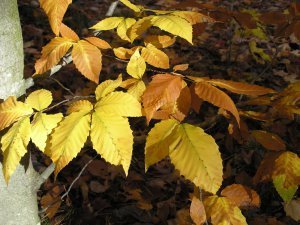 d, O Lord, is eternal; its stands firm in the heavens. Your faithfulness continues through all generations.” (Psalm 119:89,90) God’s faithfulness guarantees his ongoing commitment to keep his promises. And his power enables him to actually fulfill them. “His divine power has given us everything we need for life and godliness through our knowledge of him . . . through these he has given us his very great and precious promises.” (2 Peter 1:3,4)
d, O Lord, is eternal; its stands firm in the heavens. Your faithfulness continues through all generations.” (Psalm 119:89,90) God’s faithfulness guarantees his ongoing commitment to keep his promises. And his power enables him to actually fulfill them. “His divine power has given us everything we need for life and godliness through our knowledge of him . . . through these he has given us his very great and precious promises.” (2 Peter 1:3,4)





